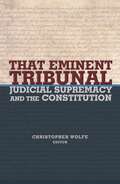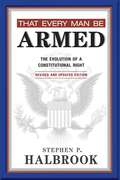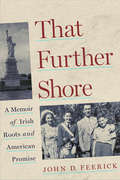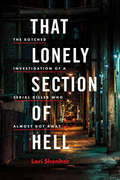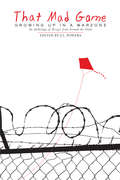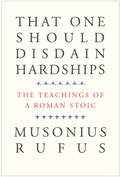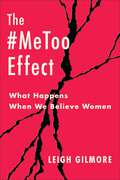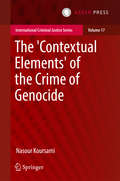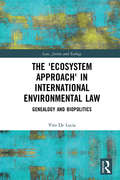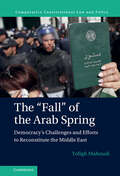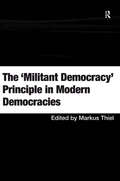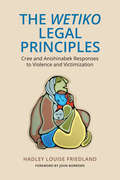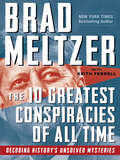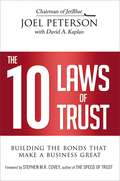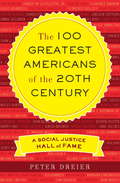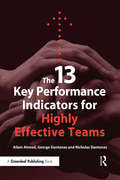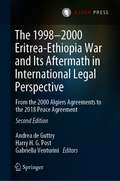- Table View
- List View
That Eminent Tribunal: Judicial Supremacy and the Constitution (New Forum Books #35)
by Christopher WolfeThe role of the United States Supreme Court has been deeply controversial throughout American history. Should the Court undertake the task of guarding a wide variety of controversial and often unenumerated rights? Or should it confine itself to enforcing specific constitutional provisions, leaving other issues (even those of rights) to the democratic process? That Eminent Tribunal brings together a distinguished group of legal scholars and political scientists who argue that the Court's power has exceeded its appropriate bounds, and that sound republican principles require greater limits on that power. They reach this conclusion by an interesting variety of paths, and despite varied political convictions. Some of the essays debate the explicit claims to constitutional authority laid out by the Supreme Court itself in Planned Parenthood v. Casey and similar cases, and others focus on the defenses of judicial authority found commonly in legal scholarship (e.g., the allegedly superior moral reasoning of judges, or judges' supposed track record of superior political decision making). The authors find these arguments wanting and contend that the principles of republicanism and the contemporary form of judicial review exercised by the Supreme Court are fundamentally incompatible. The contributors include Hadley Arkes, Gerard V. Bradley, George Liebmann, Michael McConnell, Robert F. Nagel, Jack Wade Nowlin, Steven D. Smith, Jeremy Waldron, Keith E. Whittington, Christopher Wolfe, and Michael P. Zuckert.
That Every Man Be Armed: The Evolution of a Constitutional Right. Revised and Updated Edition.
by Stephen P. HalbrookThat Every Man Be Armed, the first scholarly book on the Second Amendment to the U.S. Constitution, has played a significant role in constitutional debate and litigation since it was first published in 1984. Halbrook traces the right to bear arms from ancient Greece and Rome to the English republicans, then to the American Revolution and Constitution, through the Reconstruction period extending the right to African Americans, and onward to today&’s controversies. With reviews of recent literature and court decisions, this new edition ensures that Halbrook&’s study remains the most comprehensive general work on the right to keep and bear arms.
That Further Shore: A Memoir of Irish Roots and American Promise
by John D. FeerickA rare and evocative memoir of a respected constitutional scholar, dedicated public servant, political reformer, and facilitator of peace in the land of his ancestors.John D. Feerick’s life has all the elements of a modern Horatio Alger story: the poor boy who achieves success by dint of his hard work. But Feerick brought other elements to that classic American success story: his deep religious faith, his integrity, and his paramount concern for social justice. In his memoir, The Further Shore, Feerick shares his inspiring story, from his humble beginnings: born to immigrant parents in the South Bronx, going on to practice law, participating in framing the U.S. Constitution’s Twenty-Fifth Amendment, serving as dean of Fordham Law, and serving as President of the New York City Bar Association and chair of state commissions on government integrity.Beginning with Feerick’s ancestry and early life experiences, including a detailed genealogical description of Feerick’s Irish ancestors in County Mayo and his laborious quest to identify them and their relationships with one another, the book then presents an evocative survey of the now-vanished world of a working-class Irish Catholic neighborhood in the South Bronx. Feerick’s account of how he financed his education from elementary school through law school is a moving tribute to the immigrant work ethic that he inherited from his parents and shared with many young Americans of his generation. The book then traces Feerick’s career as a lawyer and how he gave up a lucrative partnership in a prestigious New York City law firm at an early age to accept the office of Dean of the Fordham School of Law at a fraction of his previous income because he felt it was time to give back something to the world.John Feerick has consistently shown his commitment to the law as a vocation as well as a profession by his efforts to protect the rights of the poor, to enable minorities to achieve their rightful places in American society, and to combat political corruption. That Further Shore is an inspiring memoir of how one humble and decent man helped to make America a more just and equitable society.
That Lonely Section of Hell
by Lori ShenherFrom her first assignment in 1998 to explore an increase in the number of missing women to the harrowing 2002 interrogation of convicted serial killer Robert Pickton, Lori Shenher tells a story of massive police failure-failure of the police to use the information about Pickton available to them, failure to understand the dark world of drug addiction and sex work, and failure to save more women from their killer.Shenher explains how police unwillingness to believe the women were missing or murdered, jurisdictional squabbles, and a fear of tunnel vision conspired to leave women unprotected and vulnerable to a serial killer nearly three years after she first received a tip that Pickton could be responsible. She unflinchingly reveals her own pain and psychological distress as a result of these events, which left her unable to work with or trust the police and the criminal justice system. That Lonely Section of Hell reveals the deeper truths behind the causes of this tragedy and the myriad ways the system-and society-failed to protect vulnerable people.
That Mad Game
by J. L. PowersWhat's it like to grow up during war? To be a victim of violence or exiled from your homeland, culture, family, and even your own memories? When America's talking heads talk about war, children and teenagers are often the forgotten part of the story. Yet who can forget images of the Vietnam "baby lift," when Amer-Asian children were flown out of Vietnam to be adopted by Americans? Who can forget the horror of learning that Iranian children were sent on suicide missions to clear landmines? Who wasn't captivated by stories of the "lost boys" of Sudan, traveling thousands of miles alone through the desert, seeking shelter and safety? From the cartel-terrorized streets of Juárez to the bombed-out cities of Bosnia to Afghanistan under the Taliban, from Nazi-occupied Holland to the middle-class American home of a Vietnam vet, this collection of personal and narrative essays explores both the universal and particular experiences of children and teenagers who came of age during a time of war.J.L. Powers is the editor of Labor Pains and Birth Stories and the author of two young adult novels, most recently This Thing Called the Future, an alternative fantasy set in post-apartheid South Africa. She began collecting essays on children and war while pregnant with her first child and says, "The experience was both painful and uplifting, not unlike giving birth. The most memorable aspect of these essays is their stark portrayal of both survival and hope in the midst of incredible suffering."
That One Should Disdain Hardships: The Teachings of a Roman Stoic
by Musonius RufusPerennial wisdom from one of history&’s most important Stoic teachers The Stoic philosopher Musonius Rufus was one of the most influential teachers of his era, imperial Rome, and his message still resonates with startling clarity today. Alongside Stoics like Seneca, Epictetus, and Marcus Aurelius, he emphasized ethics in action, displayed in all aspects of life. Merely learning philosophical doctrine and listening to lectures, they believed, will not do one any good unless one manages to interiorize the teachings and apply them to daily life. In Musonius Rufus&’s words, &“Philosophy is nothing else than to search out by reason what is right and proper and by deeds to put it into practice.&” At a time of renewed interest in Stoicism, this collection of Musonius Rufus&’s lectures and sayings, beautifully translated by Cora E. Lutz and introduced by Gretchen Reydams-Schils, offers readers access to the thought of one of history&’s most influential and remarkable Stoic thinkers.
That's Not What They Meant!: Reclaiming the Founding Fathers from America's Right Wing
by Michael AustinThis book examines dozens of books, articles, speeches, and radio broadcasts by such figures as Glenn Beck, Mark Levin, Sean Hannity, Larry Schweikart, and David Barton to expose the deep historical flaws in their use of America's founding history. In contrast to their misleading method of citing proof texts to serve a narrow agenda, Austin allows the Founding Fathers to speak for themselves, situating all quotations in the proper historical context. What emerges is a true historical picture of men who often disagreed with one another on such crucial issues as federal power, judicial review, and the separation of church and state. As Austin shows, the real legacy of the Founding Fathers to us is a political process: a system of disagreement, debate, and compromise that has kept democracy vibrant in America for more than two hundred years. Austin's carefully researched and rigorously arguedbook is essential reading for anyone seeking the accurate historical background to many of the today's hot-button political debates.
The #1 Lawyer: A Thriller
by James Patterson Nancy AllenBiloxi&’s best criminal defense attorney has never lost a case. Then his client&’s beautiful wife is murdered, and America&’s #1 lawyer suddenly becomes its #1 suspect. Stafford Lee Penney is a small-town lawyer with a big-time reputation for winning every case he tries. In his sharp suits and polished Oxford shoes, Penney is Biloxi, Mississippi&’s #1 Lawyer and top local celebrity. Just as Penney notches his latest courtroom victory, his wife is scandalously killed. He spirals into a legal and personal losing streak, damaging his reputation and ruining his career. That&’s when Penney makes a bold decision. He stops trading on his power-lawyer identity and creates a new one: lawyer lifeguard. Moonlighting at the beach, showing up to court in flip-flops, mentoring a law student, the new Penney is at first unrecognizable. It&’s said that a lawyer who represents himself has a fool for a client. But when Penney is accused of murder, the #1 Lawyer will find a way to triumph.
The #MeToo Effect: What Happens When We Believe Women (Gender and Culture Series)
by Leigh GilmoreThe #MeToo movement inspired millions to testify to the widespread experience of sexual violence. More broadly, it shifted the deeply ingrained response to women’s accounts of sexual violence from doubting all of them to believing some of them. What changed?Leigh Gilmore provides a new account of #MeToo that reveals how storytelling by survivors propelled the call for sexual justice beyond courts and high-profile cases. At a time when the cultural conversation was fixated on appeals to legal and bureaucratic systems, narrative activism—storytelling in the service of social change—elevated survivors as authorities. Their testimony fused credibility and accountability into the #MeToo effect: uniting millions of separate accounts into an existential demand for sexual justice and the right to be heard.Gilmore reframes #MeToo as a breakthrough moment within a longer history of feminist thought and activism. She analyzes the centrality of autobiographical storytelling in intersectional and antirape activism and traces how literary representations of sexual violence dating from antiquity intertwine with cultural notions of doubt, obligation, and agency. By focusing on the intersectional prehistory of #MeToo, Gilmore sheds light on how survivors have used narrative to frame sexual violence as an urgent problem requiring structural solutions in diverse global contexts. Considering the roles of literature and literary criticism in movements for social change, The #MeToo Effect demonstrates how “reading like a survivor” provides resources for activism.
The 'Contextual Elements' of the Crime of Genocide (International Criminal Justice Series #17)
by Nasour KoursamiThis book examines the position of ‘contextual elements’ as a constitutive element of the legal definition of the crime of genocide, and determines the extent to which an individual génocidaire is required to act within a particular genocidal context.Unlike other books in the field of the study of the crime of genocide, this book captures the nuance and the complex issues of the debate by providing book-length comprehensive examination of the position of contextual elements in light of the evolution of genocide as a concept and the literal legal definition of the crime of genocide, which expressly characterized the crime with only the existence of an individualistic intent to destroy a group.With scholars of international criminal law, students, researchers, practitioners in the field, and international criminal tribunals in mind, the author tackles many of the issues raised on the position of contextual elements in both academic literature and judicial decisions.Nasour Koursami is the Director of Applied Research and a Lecturer at the National School of Administration in Chad. He studied law at Cardiff and Bristol Universities and holds a Ph.D. in International Law from the University of Edinburgh.
The 'Ecosystem Approach' in International Environmental Law: Genealogy and Biopolitics (Law, Justice and Ecology)
by Vito De LuciaThe ecosystem approach, broadly understood as a legal and governance strategy for integrated environmental and biodiversity management, has been adopted within a wide variety of international environmental legal regimes and provides a narrative, a policy approach and in some cases legally binding obligations for States to implement what has been called a ‘new paradigm’ of environmental management. In this last respect, the ecosystem approach is also often considered to offer an opportunity to move beyond the outdated anthropocentric framework underpinning much of international environmental law, thus helping re-think law in the Anthropocene. Against this background, this book addresses the question of whether the ecosystem approach represents a paradigm shift in international environmental law and governance, or whether it is in conceptual and operative continuity with legal modernity. This central question is explored through a combined genealogical and biopolitical framework, which reveals how the ecosystem approach is the result of multiple contingencies and contestations, and of the interplay of divergent and sometimes irreconcilable ideological projects. The ecosystem approach, this books shows, does not have a univocal identity, and must be understood as both signalling the potential for a decisive shift in the philosophical orientation of law and the operationalisation of a biopolitical framework of control that is in continuity with, and even intensifies, the eco-destructive tendencies of legal modernity. It is, however, in revealing this disjunction that the book opens up the possibility of moving beyond the already tired assessment of environmental law through the binary of anthropocentrism and ecocentrism.
The 'Fall' of the Arab Spring: Democracy's Challenges and Efforts to Reconstitute the Middle East (Comparative Constitutional Law and Policy)
by Tofigh MaboudiConstitutional bargains are seen as cornerstones of democratic transitions in much of the world. Yet very few studies have theorized about the link between constitution-making and democratization. Shifting the focus on democratization away from autocratic regime break down, this book considers the importance of inclusive constitution-building for democratization. In this pathbreaking volume, Tofigh Maboudi draws on a decade of research on the Arab Spring to explain when and how constitutional bargains facilitate (or hinder) democratization. Here, he argues that constitutional negotiations have a higher prospect of success in establishing democracy if they resolve societal, ideological, and political ills. Emphasizing the importance of constitution-making processes, Maboudi shows that constitutions can resolve these problems best through participatory and inclusive processes. Above all, The 'Fall' of the Arab Spring demonstrates that civil society is the all-important link that connects constitutional bargaining processes to democratization.
The 'Militant Democracy' Principle in Modern Democracies
by Markus ThielThis collection provides an up-to-date analysis of key country approaches to Militant Democracy. Featuring contributions from some of the key people working in this area, including Mark Tushnet and Helen Irving, each chapter presents a stocktaking of the legal measures to protect the democracy against its enemies within. In addition to providing a description of the country's view of Militant Democracy and the current situation, it also examines the legal and political provisions to defend the democratic structure against attacks. The discussion also presents proposals for the development of the Militant Democracy principle or its alternatives in policy and legal practice. In the final chapter the editor compares the different arrangements and formulates a minimum consensus as to what measures are indispensable to protect a democracy. Highly topical, this book is a valuable resource for students, academics and policy-makers concerned with democratic principles.
The 'War on Terror' and the Framework of International Law
by Helen DuffyThe acts of lawlessness committed on September 11, 2001 have been followed by a 'war on terror'. This book considers the law relevant to assessing how such terrorist' acts should be understood in legal terms, which responses to them are permissible and how those responses are to be pursued. It considers some of the actions that have unfolded since 9/11 (military intervention, law enforcement initiatives, human rights restrictions and abuse) prompting questions as to the 'war on terror's lawfulness. The volume clearly designates areas of international law where interest has escalated beyond traditional academic legal circles.
The 'Wetiko' Legal Principles: Cree and Anishinabek Responses to Violence and Victimization
by Hadley Louise FriedlandIn Algonquian folklore, the wetiko is a cannibal monster or spirit that possesses a person, rendering them monstrous. In The Wetiko Legal Principles, Hadley Friedland explores how the concept of a wetiko can be used to address the unspeakable happenings that endanger the lives of many Indigenous children. Friedland critically analyses Cree and Anishinabek stories and oral histories alongside current academic and legal literature to find solutions to the frightening rates of intimate violence and child victimization in Indigenous communities. She applies common-law legal analysis to these Indigenous stories and creates a framework for analysing stories in terms of the legal principles that they contain. The author reveals similarities in thinking and theorizing around the dynamics of wetikos and offenders in cases of child sexual victimization. Friedland’s respectful, strength-based, trauma-informed approach builds on the work of John Borrows and is the first to argue for a legal category derived from Indigenous legal traditions. The Wetiko Legal Principles provides much needed direction for effectively applying Indigenous legal principles to contemporary social issues.
The 10 Greatest Conspiracies of All Time: Decoding History's Unsolved Mysteries
by Brad MeltzerMaster storyteller Brad Meltzer counts down and decodes the world’s top 10 most intriguing conspiracies stories. Wanted: the truth. In a riveting collection, Brad Meltzer guides us through the 10 greatest conspiracies of all time, from Leonardo da Vinci’s stolen prophecy to the Kennedy assassination. <P><P>This richly illustrated book serves up those fascinating, unexplained questions that nag at history buffs and conspiracy lovers: Why was Hitler so intent on capturing the Roman “Spear of Destiny?” Where did all the Confederacy’s gold go? What is the government hiding in Area 51? And did Lee Harvey Oswald really act alone? Meltzer sifts through the evidence, weighs competing theories, separates what we know to be true and what’s still––and perhaps forever––unproved or unprovable, and in the end, decodes the mystery and arrives at the most likely explanation.
The 10 Laws of Trust: Building the Bonds That Make a Business Great
by David A. Kaplan Joel PetersonBecause you can't afford to lose it... Trust is the glue that holds an organization together.<p> It turns deflection into transparency, suspicion into empowerment, and conflict into creativity. <p>With it, a tiny company like John Deere grew into a worldwide leader. <p>Without it, a giant corporation like Enron toppled. <p>In The 10 Laws of Trust, JetBlue chairman Joel Peterson explores how a culture of trust gives companies an edge. <p>Consider this: What does it feel like to work for a firm where leaders and colleagues trust one another?<p> Freed from micromanagement and rivalry, every employee contributes his or her best.<p> Risk taking and innovation become the norm. <p>And, as Peterson notes, "When a company has a reputation for fair dealing, its costs drop: Trust cuts the time spent second-guessing and lawyering." <p>In clear, engaging prose, highlighted by compelling examples, Peterson details how to establish and maintain a culture of trust. <p>Steps include: Start with integrity * Invest in respect * Empower everyone * Require accountability * Create a winning vision * Keep everyone informed * Budget in line with expectations * Embrace conflict * Forget "you" to become an effective leader * And more With this book in hand, you'll be able to plant the seeds of trust-and reap the rewards of reputation, profits, and success.
The 10 Secrets of Entrepreneurs: How to stop being just an employee
by Keith Cameron SmithThe Ten Secrets of Entrepreneurs is a compelling guide to the ten key differences between successful or extraordinary entrepreneurs and unsuccessful or ordinary employees and the way they think and behave. This life-changing book will show how anyone can learn to switch their thinking to that of an extraordinary entrepreneurs and enjoy a more rewarding and fulfilling professional and personal life. The distinctions include:Entrepreneurs have an empowering perspective of failure.Employees see failure as bad.Entrepreneurs are solution finders.Employees are problem solvers.Entrepreneurs look into the future.Employees look into the past.In uncertain times, everyone wants to have more meaning and purpose in their professional and personal lives. In this inspirational and prescriptive guide, Keith Cameron Smith leads readers from a passive and possibly fearful view of their future to one they can actively engage in and firmly believe in.
The 10-Day MBA: A step-by-step guide to mastering the skills taught in top business schools
by Steven Silbiger'Anyone who has ever wished they attended a top-ten MBA school now has an alternative. Silbiger's The 10-Day MBA. It distils the basics of a top MBA programme. It's interesting, informative and certainly cheaper. I recommend it!' Tom Fischgrund, author of The Insider's Guide to the Top Ten Business SchoolsA business classic, The 10-Day MBA provides an invaluable guide for all the people who do not have the time or resources to take a full-time business degree, or who require a short revision aid. Internationally acclaimed, this carefully structured and easy-to-read course will enable you to understand the concepts and jargon used in the business world without having to leave your desk. Here is your chance to become familiar with the key tools and theories taught at Harvard and Stanford and other leading business schools - in just ten days!
The 10-Day MBA: A step-by-step guide to mastering the skills taught in top business schools
by Steven Silbiger'Anyone who has ever wished they attended a top-ten MBA school now has an alternative. Silbiger's The 10-Day MBA. It distils the basics of a top MBA programme. It's interesting, informative and certainly cheaper. I recommend it!' Tom Fischgrund, author of The Insider's Guide to the Top Ten Business SchoolsA business classic, The 10-Day MBA provides an invaluable guide for all the people who do not have the time or resources to take a full-time business degree, or who require a short revision aid. Internationally acclaimed, this carefully structured and easy-to-read course will enable you to understand the concepts and jargon used in the business world without having to leave your desk. Here is your chance to become familiar with the key tools and theories taught at Harvard and Stanford and other leading business schools - in just ten days!
The 100 Greatest Americans of the 20th Century: A Social Justice Hall of Fame
by Peter DreierA hundred years ago, any soapbox orator who called for womenOCOs suffrage, laws protecting the environment, an end to lynching, or a federal minimum wage was considered a utopian dreamer or a dangerous socialist. Now we take these ideas for granted? because the radical ideas of one generation are often the common sense of the next. We all stand on the shoulders of earlier generations of radicals and reformers who challenged the status quo of their day. Unfortunately, most Americans know little of this progressive history. It isnOCOt taught in most high schools. You canOCOt find it on the major television networks. In popular media, the most persistent interpreter of AmericaOCOs radical past is Glenn Beck, who teaches viewers a wildly inaccurate history of unions, civil rights, and the American Left. "The 100 Greatest Americans of the 20th Century," a colorful and witty history of the most influential progressive leaders of the twentieth century and beyond, is the perfect antidote.
The 13 Key Performance Indicators for Highly Effective Teams
by Allam Ahmed George Siantonas Nicholas SiantonasAn organisation's most important asset is its people. And critical to an organisation's success is the extent to which its people interact effectively – both with each other as team members and with the wider organisation. This is why managing teams has become a key area for a growing number of organisations around the world. While many organisations are world-class at managing their materials and machinery, they fall short in managing the human side of their activities.This book outlines the challenges faced by both team leaders and team members in 21st-century workplaces. It proposes 13 key performance or "team health" indicators for highly effective teams based on research data collected from a large range of industry sectors, team sizes and organisations in the UK. It contributes to the understanding of the nature and functioning of team cohesiveness by describing teamwork as a multi-component variable and identifying the factors that impact on teams and the implications of teamwork for organisations.The book sets out to aid organisations by introducing a Team Performance Diagnostic (TPD) tool. The TPD enables organisations to gain an accurate and detailed insight into the real-time performance of their teams, helps team managers to understand the underlying 'people' issues within the team and how to reach higher levels of team performance quickly. The TPD has been widely used in major multinationals and the UK public sector to pinpoint hard-to-find opportunities to achieve rapid improvements.The research suggests that the use of TPD contributes to more free-flowing feedback both within the team and in the organisation as a whole, and that successful teams are indicative of a healthy organisational culture.This book is an essential guide for senior managers and policy-makers dealing with team effectiveness, and will be highly useful for students of business and management.
The 1913 McKinney Store Collapse (Disaster)
by Carol O'Keefe WilsonA powerful vibration, a deafening noise and a swell of thick dust brought residents of McKinney pouring into the public square on the afternoon of January 23, 1913. What they saw was horrifying--an entire building had collapsed, demolishing two popular retailers, the Cheeves Mississippi Store and Tingle Implement Store. Their contents, including many shoppers and clerks, spilled out into the streets, where layer upon layer of debris settled into a massive, ragged pile. In spite of a herculean rescue effort, eight people perished. Carol Wilson sifts through the disaster and its aftermath, dredging up some troubling facts about how the tragedy might have been prevented.
The 1998–2000 Eritrea-Ethiopia War and Its Aftermath in International Legal Perspective: From the 2000 Algiers Agreements to the 2018 Peace Agreement
by Andrea De Guttry Gabriella Venturini Harry H. G. PostThis book centres on the war that raged between Eritrea and Ethiopia from 1998 to 2000, a war that caused great loss of life and tremendous devastation. It analyses the war in great detail from an international legal perspective: the nature and the state of the boundary conflict preceding the actual armed conflict, the military actions themselves, the role of the UN peace-keeping mission, the responsibility for the multitude of explosive remnants of the war left behind. Ample attention is paid to the decisions of the Eritrea-Ethiopia Claims Commission and the Eritrea-Ethiopia Boundary Commission. This study is not limited to the war and the period immediately following it, it also examines its more extended aftermath prolonging the analysis as far as the more recent improvement in the relations between Eritrea and Ethiopia, away from a situation of ‘no war, no peace’ that prevailed after the armed conflict ended. The analysis of the war and its aftermath is not only in terms of international legal issues, it has been placed in a wider than strictly legal perspective. The book is a valuable work for academics and practitioners in international law, human rights and humanitarian law in particular, for political scientists, diplomats, civil servants, historians, and all those others seriously interested in the Horn of Africa. Andrea de Guttry is Full Professor of Public International Law at the Scuola Superiore Sant'Anna in Pisa, Italy. Harry H.G. Post is Adjunct Professor in the Faculté Libre de Droit of the Université Catholique de Lille in Lille, France. Gabriella Venturini is Professor Emerita in the Dipartimento di Studi internazionali, giuridici e storico-politici of the Università degli Studi di Milano in Milan, Italy.
The 19th Christmas (Women's Murder Club #19)
by James Patterson Maxine PaetroIf the Women's Murder Club can't be together this Christmas, a killer is to blame. <P><P>As the holidays approach, Detective Lindsay Boxer and her friends in the Women's Murder Club have much to celebrate. Crime is down. The medical examiner's office is quiet. Even the courts are showing some Christmas spirit. And the news cycle is so slow that journalist Cindy Thomas is on assignment to tell a story about the true meaning of the season for San Francisco. <P><P>Then a fearsome criminal known only as "Loman" seizes control of the headlines. He is planning a deadly surprise for Christmas morning. And he has commissioned dozens of criminal colleagues to take actions that will mask his plans. All that Lindsay and the SFPD can figure out is that Loman's greed -- for riches, for bloodshed, for attention -- is limitless. <P><P>Solving crimes never happens on schedule, but as this criminal mastermind unleashes credible threats by the hour, the month of December is upended for the Women's Murder Club. Avoiding tragedy is the only holiday miracle they seek. <P><P><b>A New York Times Bestseller</b>
